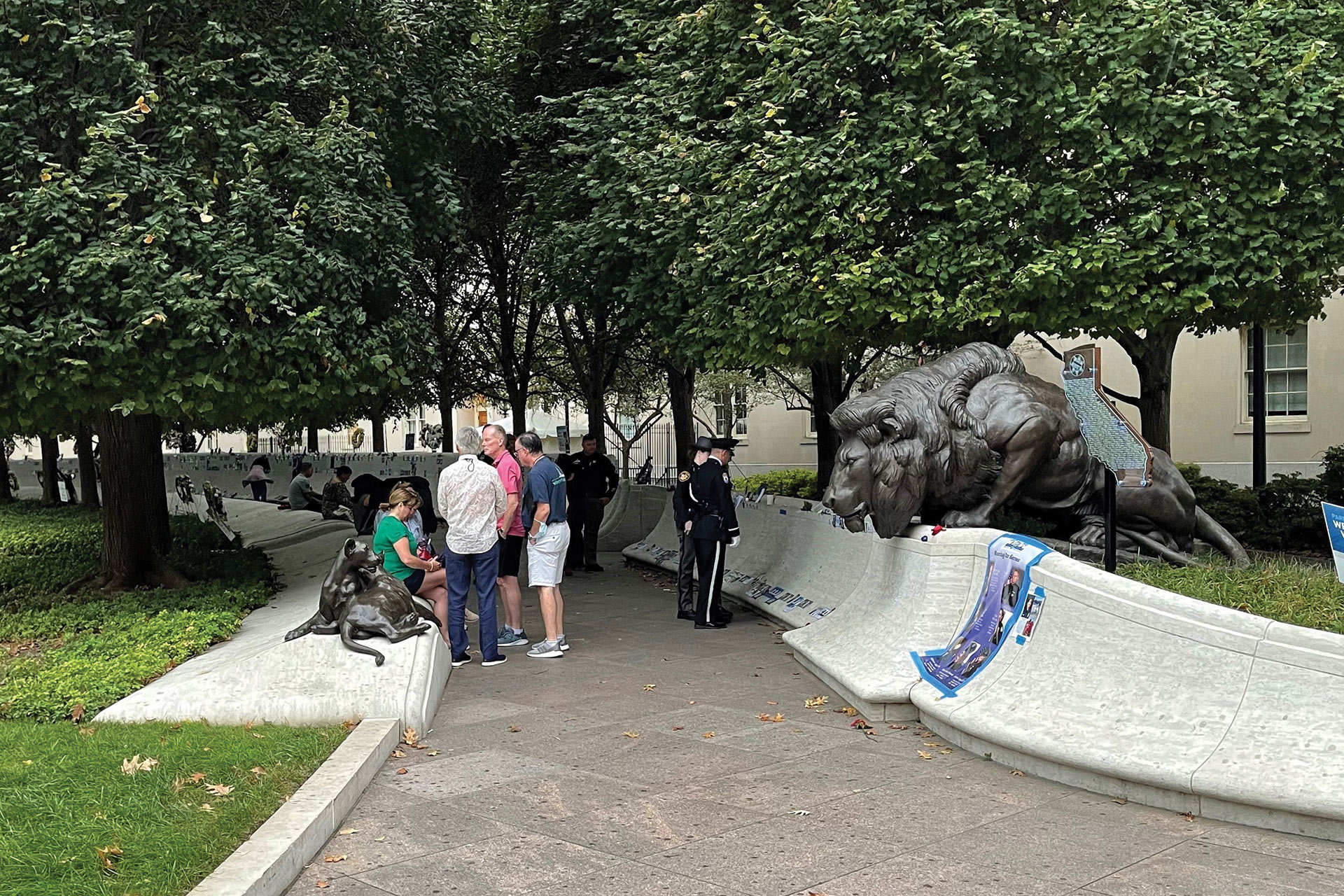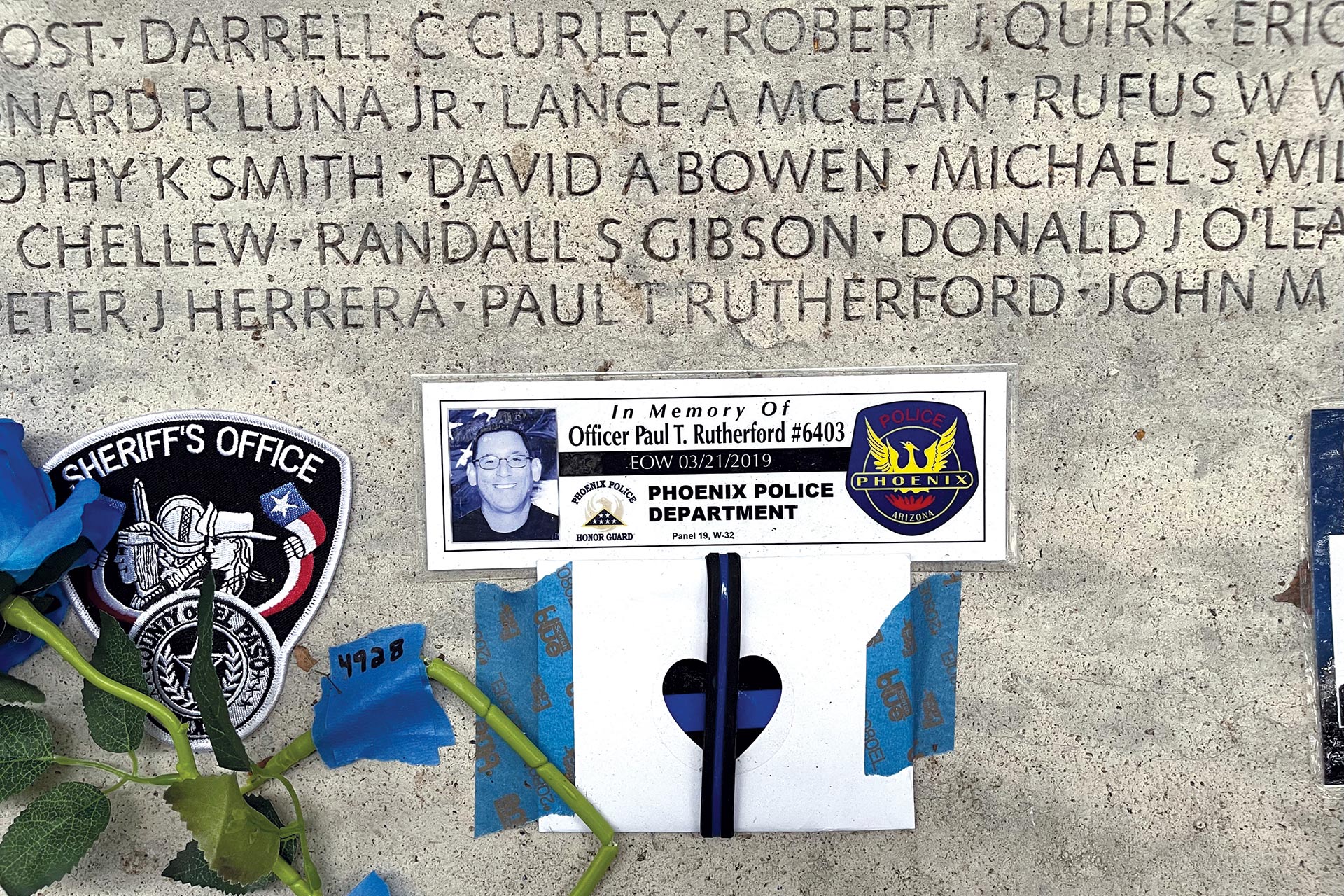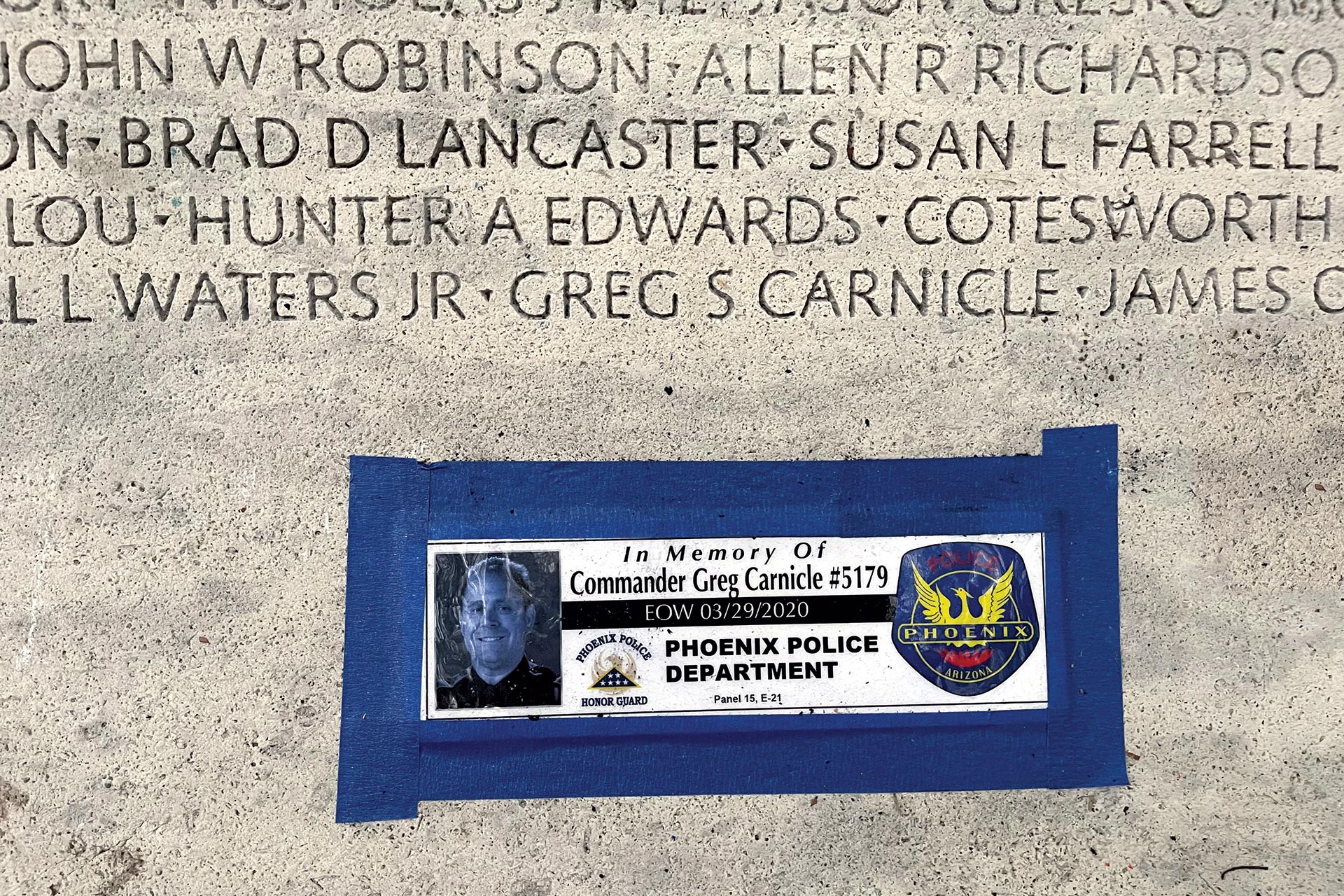
Phoenix Police Commander Greg Carnicle (EOW: March 29, 2020) and Officer Paul Rutherford (EOW: March 21, 2019) were two of the 701 fallen heroes who had their names etched on the walls of the National Law Enforcement Officers Memorial and read by high-ranking government officials and leaders from local, state and federal law enforcement agencies during the 33rd Annual Candlelight Vigil. The vigil, which was part of National Police Weekend, was a time to honor the life and sacrifices of two heroes who shared a commitment to community and family.

On March 21, 2019, PLEA was devastated to learn about the passing of Officer Rutherford, who succumbed to injuries he received when he was struck by a vehicle near the intersection of 75th Avenue and Indian School Road. Always referring to himself as “the everyday, average, run-of-the-mill street cop,” Rutherford proved to be so much more during his 23 years of service with the Phoenix Police Department. Traveling to Washington, D.C., for the National Police Weekend events was Rutherford’s family, who were joined by Rutherford’s squad mates and officers from the Employee Assistant Unit.

A little over a year after Rutherford’s tragic passing, on March 29, Phoenix P.D. lost another hero — Commander Greg Carnicle, who was shot and killed while he and two other officers were responding to a domestic disturbance call. Carnicle served with the Department for 31 years and was scheduled to retire in just a few months. After the incident, Carnicle’s family provided the following statement to the Department: “There are literally no words that can properly convey the incredible man our husband and father was. He was a selfless man who was always there for a neighbor, a friend, his brothers in blue, but mostly his family. He dedicated his life to serve, protect, provide for, and love us. He was truly our hero and always will be. He touched many lives and many hearts have now been broken. We are beyond thankful for our community. We appreciate the outpouring of kind words and we hear your prayers. We know he will live on through the character and love he built in our family. We are strong because of him and we will do our best to live to the fullest to honor him.”
One of the most touching moments from the candlelight vigil came when Carnicle’s young grandson was seen kissing his grandfather’s picture on the memorial wall, a moment that serves as a reminder of the great loss each family faces with the loss of their loved one. We will always remember the bravery and sacrifices Commander Carnicle and Officer Rutherford made. They will always be in our thoughts and prayers.
 There’s no doubt that these are uniquely challenging times for law enforcement officers. The past 18 months have brought the ongoing anxiety of a global pandemic, the upheaval of civil unrest, rising crime, demoralizing calls to defund or even abolish police, and increased tension between law enforcement and the communities they serve. All of this only adds to the already high levels of traumatic stress officers experience in the regular course of their work, which increases the risk of psychological injury, depression and suicide. With National Suicide Awareness and Prevention Month being observed in September, PLEA urges members to be extra mindful of mental health pressures, the warning signs to watch out for, how to support those who are struggling and how to get help if needed.
There’s no doubt that these are uniquely challenging times for law enforcement officers. The past 18 months have brought the ongoing anxiety of a global pandemic, the upheaval of civil unrest, rising crime, demoralizing calls to defund or even abolish police, and increased tension between law enforcement and the communities they serve. All of this only adds to the already high levels of traumatic stress officers experience in the regular course of their work, which increases the risk of psychological injury, depression and suicide. With National Suicide Awareness and Prevention Month being observed in September, PLEA urges members to be extra mindful of mental health pressures, the warning signs to watch out for, how to support those who are struggling and how to get help if needed.
Silence has surrounded this issue for far too long, so it’s difficult to know exactly how many officers we’ve lost to suicide. The nonprofit Blue H.E.L.P. has recorded 919 suicides of police and corrections officers from 2016 through 2020, but it’s likely the true number is far greater. We do know that a record-breaking number of officers died by suicide in 2019, more than all other line-of-duty deaths that year combined. This doesn’t necessarily mean suicides are increasing — it may be a sign that the stigma is being broken and more are being reported. To better understand and prevent suicides among current and past law enforcement officers, corrections officers and 9-1-1 operators nationwide, a new law was signed by the president in June 2020. In the same way the federal government tracks the number of officers killed and assaulted in the line of duty, the Law Enforcement Suicide Data Collection Act (LESDCA) directs the FBI to institute a system of data collection to monitor suicides and attempted suicides — a major step forward in recognizing the emotional toll the job can take on officers and their families.
Even if the current statistics paint an incomplete picture, the numbers are far too high, reminding us that officers need to be just as alert to their mental health on duty as they are to physical dangers such as shootings, car accidents and heart attacks. Whether it’s PTSD tied to a specific event or the accumulation of day-to-day stress over time, emotional injuries can be life-threatening. There are many ways this traumatic stress can manifest. Here are some of the signs that indicate someone may be at risk for suicide, according to the National Suicide Prevention Lifeline:
- Talking about wanting to die or to kill themselves
- Looking for a way to kill themselves, like searching online or buying a gun
- Talking about feeling hopeless or having no reason to live
- Talking about feeling trapped or in unbearable pain
- Talking about being a burden to others
- Increasing the use of alcohol or drugs
- Acting anxious or agitated; behaving recklessly
- Sleeping too little or too much
- Withdrawing or isolating themselves
- Showing rage or talking about seeking revenge
- Extreme mood swings
If you or someone you know is experiencing symptoms of a mental health crisis, it’s important to address it. The National Alliance on Mental Illness suggests the following approaches to help:
- Talk openly and honestly. Don’t be afraid to ask questions like: “Do you have a plan for how you would kill yourself?”
- Remove means such as guns, knives or stockpiled pills.
- Calmly ask simple and direct questions, like “Can I help you call your psychiatrist?”
- If there are multiple people around, have one person speak at a time.
- Express support and concern.
- Don’t argue, threaten or raise your voice.
- Don’t debate whether suicide is right or wrong.
- If you’re nervous, try not to fidget or pace.
- Be patient.
The most important thing to know about suicide is that it’s preventable. It’s a temporary state of mind, not an inevitability. It’s usually tied to a life event that feels like an insurmountable catastrophe to the person who is suffering it, but that perception is rarely true. In the moment, a suicidal person may simply be desperate for their pain to end and feel like they have no other options. That’s why asking how someone is doing, listening with compassion and without judgment, and encouraging them to seek help are some the most powerful things you can do for a colleague, friend or family member in crisis.
The most important thing to know about suicide is that it’s preventable. It’s a temporary state of mind, not an inevitability.
Unfortunately, sharing feelings has not been a hallmark of traditional law enforcement culture, and many officers must still overcome denial, taboos and fear of professional repercussions if they are open about their emotional struggles. That is slowly changing, as agencies and policymakers increasingly recognize the importance of supporting officers’ mental health. However, the issue is too urgent to simply wait for progress to come from the top down — it’s also important to look out for and support each other. Officers routinely respond to mental health crises in their communities and intervene to prevent citizens from committing suicide, but may not remember to extend that same aid to themselves and their law enforcement brothers and sisters.
If you or someone you know is struggling with suicidal thoughts or other emotional stresses, please don’t stay silent. Here are some resources you can reach out to for help.
- Phoenix P.D. Employee Assistance Unit (EAU), which provides crisis intervention, peer support and resources for psychological services: 24/7 hotline at (602) 262-1892
- CopLine, a 100% confidential helpline for officers and their families, answered by retired police officers: 24/7 hotline at (800) 267-5463
- Crisis Text Line, which connects you with a live, trained crisis counselor: Text BLUE to 741741
- National Suicide Prevention Lifeline, free, confidential support for people in distress: 24/7 hotline at (800) 273-8255
In today’s atmosphere surrounding law enforcement, it can sometimes be too easy to feel like the world is hostile or uncaring. PLEA wants all of our members and our colleagues throughout the profession to know that they matter and are not alone. It’s OK not to be OK, but suicide is never the answer. Help is available, and there is always hope.
The terrorist attacks of September 11, 2001, rocked our country to its core, forever transformed our national security landscape and caused more law enforcement line-of-duty deaths than any other single event in American history — close to 400 over the course of that terrible day and the ensuing two decades.
After the first plane struck the World Trade Center, first responders rushed to the burning buildings to evacuate the victims, saving an estimated 25,000-plus people through their heroic efforts. Tragically, when the towers collapsed, 71 officers from seven local, state and federal agencies were killed, along with 343 New York firefighters and more than 2,800 civilians. A short time later, Richard Guadagno, an officer with the U.S. Fish and Wildlife Service, died aboard United Flight 93 when the plane crashed into a field in Shanksville, Pennsylvania, as the passengers bravely fought to regain control from the hijackers.
Furthermore, as rescue, recovery, investigation and cleanup efforts continued at the World Trade Center, Pentagon and Flight 93 sites in the following weeks, the contamination in the air posed another deadly threat. According to the CDC, tens of thousands of 9/11 first responders, recovery workers and survivors are now sick with cancer and other illnesses related to the hazards and toxins they were exposed to, and nearly 2,000 have died as a result, including hundreds of law enforcement officers. Many of those affected tirelessly advocated for health care and financial compensation until finally, in 2019, the signing of the Victim Compensation Fund Permanent Reauthorization Act ensured that the federal government would appropriate money to pay all eligible claims until 2090 — a sorely needed and deserved resource for the victims, as well as a reminder that the far-reaching repercussions of that single catastrophic day will continue to be felt for decades to come.
As we reflect on the 20th anniversary of 9/11 this month, please take time to remember the heroic actions of the fallen officers and our fellow first responders who made the ultimate sacrifice that day and afterward, those who are still suffering the effects of this tragedy, and all members of law enforcement who have worked diligently ever since to prevent future attacks. We will never forget.
Bringing Members and Their Families Together
On May 16, 700 PLEA members and their families gathered for a fun-filled Family Day at the Main Event in Avondale. Attendees of this year’s event enthusiastically participated in activities such as laser tag, bowling, pool, virtual reality (VR) games and more, and caught up with fellow members and the PLEA Board and staff over a buffet lunch.
For many, the event was highly anticipated, as it was the long-awaited follow-up to the first Family Day held in 2019, also at the Main Event. (PLEA was unable to hold the gathering in 2020 due to COVID-19 restrictions and health and safety concerns.) Members like Michael Reed, a 14-year veteran of the Phoenix Police Department, gladly welcomed the return of the event after living and working under difficult pandemic conditions over the past year-plus. “We were looking for a fun, safe day of games and food, and this year’s Family Day did not disappoint,” he said. “My daughter really liked the confidence course, my son liked laser tag and we all enjoyed the pool tables and VR games.”
The event was created by PLEA as a way to bring the membership and their families together annually in a relaxing environment that allows for members to get to know one another, foster camaraderie and engage in some friendly competition over games.
“I believe events like Family Day are important so that the membership can have a day of fun and meet the union representatives and other members outside of the professional atmosphere,” Reed adds.
PLEA partners with family entertainment company Main Event, a pro-law-enforcement business, to host the popular member gathering. The Main Event closes its doors to the public from morning to afternoon to give PLEA members exclusive access to most of the facility. This year, two VR games were added to the event.
Reed says fun events like Family Day are good ways for members to engage with the association. “It’s important for members to get involved in PLEA in order to stand together as a collective group to support each other,” he says. “I’d like to thank all of you at PLEA for making this event happen again!”
